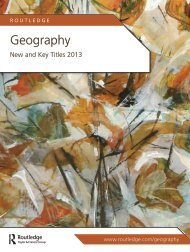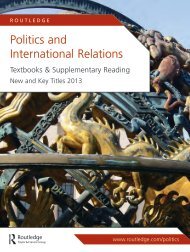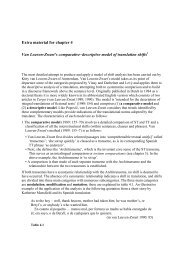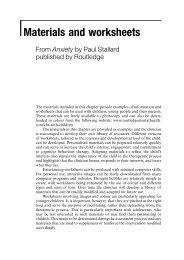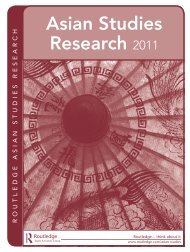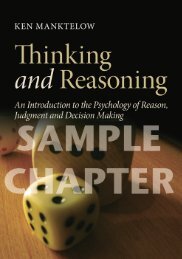Politics and International Relations 2011 (UK) - Routledge
Politics and International Relations 2011 (UK) - Routledge
Politics and International Relations 2011 (UK) - Routledge
You also want an ePaper? Increase the reach of your titles
YUMPU automatically turns print PDFs into web optimized ePapers that Google loves.
ForthcomiNg<br />
debating u.S.-Cuban<br />
<strong>Relations</strong><br />
Shall We Play Ball?<br />
Edited by Jorge I. domínguez, Rafael Hern<strong>and</strong>ez<br />
<strong>and</strong> Lorena Barberia, all at Harvard University, USA<br />
Series: Contemporary Inter-American <strong>Relations</strong><br />
Drawing on perspectives from within Cuba as well as<br />
those in the United States, Canada, <strong>and</strong> Europe,<br />
Debating U.S.-Cuban <strong>Relations</strong> sets out to analyze<br />
contemporary policies, reflect on current circumstances,<br />
<strong>and</strong> consider possible alternatives for improved<br />
U.S.-Cuban relations. Each topic is represented by<br />
perspectives from both Cuban <strong>and</strong> non-Cuban scholars,<br />
leading to a resource rich in insight <strong>and</strong> a model of<br />
transnational dialogue.<br />
Selected Contents: 1. Introduction Jorge I. Domínguez <strong>and</strong><br />
Rafael M. Hernández 2. Intimate Enemies: Paradoxes in the<br />
U.S.-Cuba conflict Rafael M. Hernández 3. Reshaping the<br />
<strong>Relations</strong> between the United States <strong>and</strong> Cuba Jorge I.<br />
Domínguez 4. Cuban National Security against the United<br />
States: Conflict <strong>and</strong> Cooperation? Carlos Alzugaray Treto<br />
5. Cuban-United States Cooperation in the Defense <strong>and</strong><br />
Security Fields: Where Are We? Where Might We Be Able to<br />
Go? Hal Klepak 6. Terrorism <strong>and</strong> the Anti-Hijacking Accord<br />
in Cuba’s <strong>Relations</strong> with the United States Peter Kornbluh<br />
7. The European Union <strong>and</strong> its role in U.S.-Cuba <strong>Relations</strong><br />
Eduardo Perera 8. European Union Policy in the Cuba-United<br />
States-Spain Triangle Susanne Gratius 9. U.S.-Cuba<br />
<strong>Relations</strong>: The Potential Economic Implications of<br />
Normalization Archibald R.M. Ritter 10. U.S.-Cuban<br />
Economic <strong>Relations</strong>: Normalization Pending Jorge Mario<br />
Sánchez Egozcue 11. U.S.-Cuba: Emigration <strong>and</strong> Bilateral<br />
<strong>Relations</strong> Antonio Aja DÌaz 12. Cuba, Its Immigration <strong>and</strong><br />
U.S.-Cuba <strong>Relations</strong> Lorena Barberia 13. The Subject(s) of<br />
Academic <strong>and</strong> Cultural Exchange: Paradigms, Powers, <strong>and</strong><br />
Possibilities Sheryl Lutjens 14. Academic Diplomacy: Cultural<br />
Exchanges between Cuba <strong>and</strong> the United States Milagros<br />
Martínez Reinosa<br />
August <strong>2011</strong>: 229 x 152: 240pp<br />
Hb: 978-0-415-89322-0: £95.00<br />
Pb: 978-0-415-89323-7: £24.99<br />
For more information, visit:<br />
www.routledge.com/9780415893237<br />
The Immigrant divide<br />
How Cuban Americans Changed<br />
the U.S. <strong>and</strong> Their Homel<strong>and</strong><br />
Susan Eckstein, Boston University, USA<br />
’Few social scientists know<br />
Cuba as deeply or as subtly<br />
as Susan Eckstein. She has<br />
written the best sociological<br />
analysis of the political<br />
evolution of the isl<strong>and</strong><br />
during the revolutionary<br />
period, Back from the Future.<br />
Now, she turns her attention<br />
to the Cuban diaspora <strong>and</strong>,<br />
with the same dispassionate<br />
eye, tells us of its behavior<br />
<strong>and</strong> its consequences both<br />
for their native <strong>and</strong> their adopted countries. A<br />
must-read for anyone interested in Cuba or<br />
immigrant politics.’ – Alej<strong>and</strong>ro Portes<br />
2009: 229 x 152: 312pp<br />
Hb: 978-0-415-99922-9: £95.00<br />
Pb: 978-0-415-99923-6: £22.99<br />
For more information, visit:<br />
www.routledge.com/9780415999236<br />
ForthcomiNg<br />
underst<strong>and</strong>ing u.S.-<br />
Latin American <strong>Relations</strong><br />
Theory <strong>and</strong> History<br />
Mark Eric Williams, Middlebury College, USA<br />
This book examines U.S.-Latin American relations from a<br />
historical, contemporary, <strong>and</strong> theoretical perspective. By<br />
drawing examples from the distant <strong>and</strong> more recent<br />
past—<strong>and</strong> interweaving history with theory—Williams<br />
illustrates the enduring principles of <strong>International</strong><br />
<strong>Relations</strong> theory <strong>and</strong> provides students with the<br />
conceptual tools required to help them organize facts,<br />
think systematically about issues, weigh competing<br />
explanations, <strong>and</strong> have confidence in their own<br />
conclusions regarding the past, present, <strong>and</strong> future of<br />
international politics in the region.<br />
Selected Contents: 1. Why U.S.-Latin American <strong>Relations</strong><br />
Matter (And Sometimes seem Unintelligible) 2. Foreign<br />
Policy Determinants: <strong>International</strong> Systems <strong>and</strong> Levels of<br />
Causality 3. The Expansion of American Power<br />
4. Hemispheric <strong>Relations</strong> through WWII 5. The Cold War<br />
Comes to Latin America 6. Crisis Management<br />
7. Responding to Revolutions 8. Globalization <strong>and</strong><br />
Interdependence 9. Hemispheric <strong>Relations</strong> in the 21st<br />
Century<br />
August <strong>2011</strong>: 229 x 152: 320pp<br />
Hb: 978-0-415-99314-2: £90.00<br />
Pb: 978-0-415-99315-9: £25.99<br />
For more information, visit:<br />
www.routledge.com/9780415993159<br />
New<br />
The united States <strong>and</strong> Cuba<br />
Intimate Enemies<br />
Marifeli Pérez-Stable, Florida <strong>International</strong><br />
University, USA, <strong>and</strong> Inter-American Dialogue<br />
Series: Contemporary Inter-American <strong>Relations</strong><br />
This book systematically covers<br />
the background of U.S.-Cuban<br />
relations after the Cold War <strong>and</strong><br />
explores tensions that extend<br />
into the twenty-first century.<br />
The author explores the future<br />
of this strained relationship<br />
under Obama’s presidency <strong>and</strong><br />
in a post-Castro Cuba.<br />
Selected Contents: 1. The United<br />
States <strong>and</strong> Cuba Have Never Had<br />
Normal <strong>Relations</strong> 2. ’Next<br />
Christmas in Havana’ 3. ’Half<br />
Drunk <strong>and</strong> Throwing Bottles at Each Other’ 4. ’We Need to<br />
De-Americanize the Problem of Cuba’ 5. ’The Policy We’ve<br />
Had in Place for 50 Years Hasn’t Worked’ 6. The United<br />
States <strong>and</strong> Cuba: Comparative Reflections (essay by Ana<br />
Covarrubias Velasco)<br />
December 2010: 229 x 152: 224pp<br />
Hb: 978-0-415-80450-9: £95.00<br />
Pb: 978-0-415-80451-6: £26.99<br />
eBook: 978-0-203-87448-6<br />
For more information, visit:<br />
www.routledge.com/9780415804516<br />
Browse <strong>and</strong> order online: www.routledge.com/politics<br />
lAtiN AmericAN <strong>Politics</strong><br />
New<br />
The Political Economy<br />
of Latin America<br />
Reflections on Neoliberalism <strong>and</strong><br />
Development<br />
Peter Kingstone, University of Connecticut, USA<br />
Neoliberalism has been at the<br />
centre of enormous controversy<br />
since its first appearance in<br />
Latin America in the early<br />
1970s. Even neoliberalism’s<br />
strongest supporters concede<br />
that it has not lived up to its<br />
promises <strong>and</strong> that growth,<br />
poverty, <strong>and</strong> inequality all have<br />
performed considerably worse<br />
than hoped.<br />
This brief text offers an<br />
unbiased reflection on the<br />
neoliberal debate in Latin America <strong>and</strong> the institutional<br />
puzzle that underlies the region’s difficulties with<br />
democratization <strong>and</strong> development. In addition to<br />
providing an overview of this key element of the Latin<br />
American political economy, Peter Kingstone also<br />
advances an important but under-explored argument<br />
about political institutions. Kingstone offers a unique<br />
contribution by mapping out the problem of how to<br />
underst<strong>and</strong> institutions, why they are created, <strong>and</strong> why<br />
Latin American ones function the way they do.<br />
Selected Contents: 1. Markets, States, <strong>and</strong> the Challenge<br />
of Development in Latin America 2. Import-Substitution<br />
Industrialization <strong>and</strong> the Great Transformation in Latin<br />
America 3. Neoliberalism <strong>and</strong> its Discontents 4. The Two<br />
Lefts <strong>and</strong> the Return of the State 5. Government, Markets<br />
<strong>and</strong> Institutions: Reflections on Development<br />
December 2010: 229 x 152: 192pp<br />
Hb: 978-0-415-99826-0: £100.00<br />
Pb: 978-0-415-99827-7: £24.99<br />
eBook: 978-0-203-88260-3<br />
For more information, visit:<br />
www.routledge.com/9780415998277<br />
15



